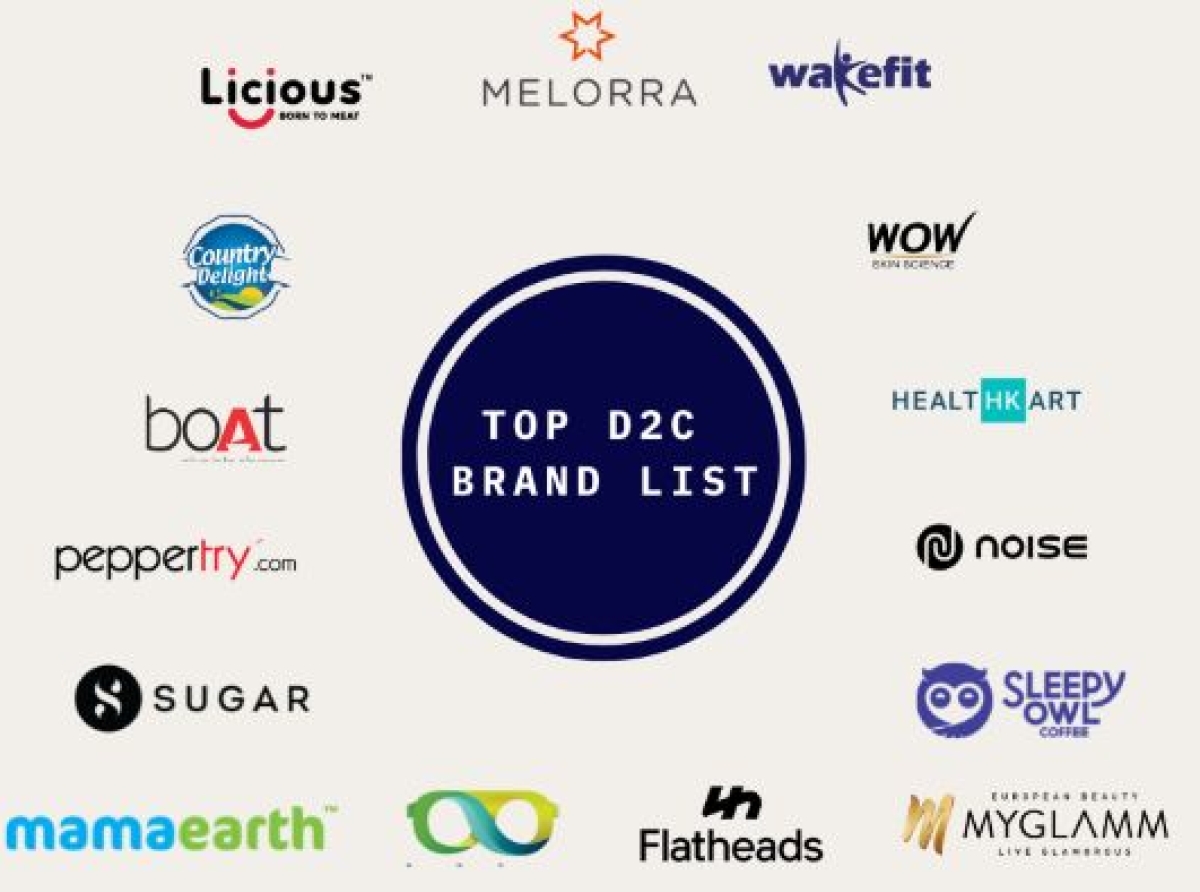Top 5 D2C Start Up Brands in India

With the advent of technology, the business world is becoming more competitive. The growth potential is increasing, and so are the brands. Global internet and e-commerce trends have increased the number of startups in India.
From a small-town boy to a big-net entrepreneur, many new brands are developing in different parts of India. They are ready to take on any challenge that comes their way!
There are many reasons for this trend. One of them is that D2C brands have a direct relationship with their customers. They can offer better prices and products. In addition, D2C business models are often more agile and innovative than traditional brands.
So, which D2C brands are expected to be in the top 5 startups in India in 2024?
GrowthJockey conducted a comprehensive survey, and here's the answer!
Traditional business models
There are many ways to start a business. For example, you could manufacture your product yourself or outsource it and then package it yourself. After that, you would have to go through the wholesaler-distributor-retailer chain to bring your product within customers' reach.
Before the product reaches the customer, a hectic cycle takes place. Manufacturers and brand owners develop their products; then, they find distributors. After this, they look for willing and able retailers to carry these products. And finally, they search for target customers!
Some brands start their stores by importing products from other countries and selling them through D2C e-commerce platforms. This approach can be expensive. So it's not always feasible for small businesses.
What is a D2C startup brand?
Before we get to GrowthJockey's top 5 D2C startup brands, let us learn about D2C startup brands.
A D2C startup is a company that sells its products through direct-to-consumer channels. This means there are no middlemen between the customer and the company. The d2c model is becoming increasingly popular as it allows companies to create more personal customer relationships. It cuts down on unnecessary costs associated with traditional business models.
D2C start-ups are growing as more companies choose this business model. Indian consumers have become comfortable buying products online. They are willing to try new brands. According to GrowthJockey, this makes India a fertile ground for D2C start-ups.
Some of the top D2C start-ups include Swiggy, Zomato, Oyo Rooms, and PhonePe.
If you want to start your own business, take inspiration from these top 5 D2C startup brands!
Top 5 D2C Start-Up Brands in India in 2024
The landscape of direct-to-consumer (D2C) startups in India has continued to evolve and expand in 2024. Here is a detailed look at the top 5 D2C startup brands in India for 2024, offering insights into their journeys, business models, and future potential.

1. boAt Lifestyle
Founders: Aman Gupta and Sameer Mehta
Year: 2016
Valuation: $1.4 billion
Overview: boAt Lifestyle has carved a niche for itself in the consumer electronics market with a customer-centric approach and trendy audio products. The brand is known for its high-quality, affordable audio devices, including headphones, earphones, smartwatches, and speakers. boAt’s success can be attributed to its strong marketing strategies, collaborations with celebrities, and active engagement on social media platforms. The company has maintained a strong resonance with music lovers and tech enthusiasts, ensuring it stays ahead in the competitive D2C space.
boAt continues to innovate, recently introducing new product lines that integrate advanced technologies such as noise cancellation and voice assistants. The brand's commitment to delivering value-for-money audio solutions has solidified its position as a market leader, with a dedicated fanbase that appreciates both the aesthetics and performance of its products.
2. Wakefit
Founders: Ankit Garg and Chaitanya Ramalingegowda
Year: 2016
Valuation: $450 million (2023)
Overview: Wakefit has revolutionized the mattress industry in India by offering orthopedic memory foam mattresses directly to consumers. The company focuses on providing high-quality sleep products at affordable prices, bypassing traditional retail markups through its D2C model. Wakefit's product range includes mattresses, pillows, bed frames, and other sleep accessories, all designed with extensive research on sleep ergonomics.
The brand's emphasis on health and comfort, combined with a user-friendly online shopping experience, has garnered widespread acclaim. Wakefit's success is also driven by its commitment to innovation, regularly updating its product offerings based on customer feedback and market trends. As more consumers prioritize health and wellness, Wakefit is well-positioned to continue its growth in the sleep solutions market.
3. Sugar Cosmetics
Founders: Vineeta Singh and Kaushik Mukherjee
Year: 2015
Valuation: $150 million (2023)
Overview: Sugar Cosmetics has become a go-to brand for makeup enthusiasts, particularly among millennials and Gen Z. The company offers high-quality, cruelty-free makeup products that cater to diverse skin tones and beauty preferences. Sugar Cosmetics stands out with its trendy and vibrant collections, known for impressive pigmentation and long-lasting wear.
The brand's strategic use of social media and influencer collaborations has helped build a strong online community. By engaging with beauty bloggers and makeup artists, Sugar Cosmetics has fostered a sense of inclusivity and empowerment among its customers. The company's commitment to sustainability and ethical practices, including eco-friendly packaging and avoiding harmful ingredients, aligns with the growing awareness of conscious beauty consumption.
4. The Man Company
Founders: Hitesh Dhingra, Rohit Chawla, and Parvesh Bareja
Year: 2015
Valuation: $300 million (2023)
Overview: Specializing in premium men’s grooming products, The Man Company has established itself as a leader in the D2C space. The brand offers a wide range of grooming essentials, including beard oils, shaving creams, face washes, and hair care products, all made with natural ingredients and free from harmful chemicals.
The Man Company's focus on promoting male self-care and well-being has resonated with health-conscious consumers. The brand's strategic use of influencer marketing and social media has helped it connect with its target audience, building a loyal customer base. By maintaining direct relationships with customers, The Man Company ensures quick feedback loops and personalized communication, contributing to its continued growth and innovation.
5. Mamaearth
Founders: Varun Alagh and Ghazal Alagh
Year: 2016
Valuation: $1.2 billion
Overview: Mamaearth is a leading player in the natural and toxin-free personal care segment. Initially focusing on baby care products, the brand has expanded its range to include skincare and haircare products for all ages. Mamaearth’s emphasis on safety and efficacy has earned it a strong reputation among consumers, particularly parents who prioritize natural products for their children.
The brand leverages a D2C model to maintain close customer relationships, gather feedback, and adapt to market demands swiftly. Mamaearth's commitment to sustainability is evident in its eco-friendly packaging and initiatives to reduce its carbon footprint. As the demand for natural and organic personal care products continues to rise, Mamaearth is well-positioned to capitalize on this trend and drive future growth.
The Future of D2C Brands in India
The D2C sector in India is experiencing rapid growth, driven by increased internet penetration and changing consumer preferences. Brands are leveraging technology to enhance their customer engagement, streamline operations, and innovate product offerings. The COVID-19 pandemic has further accelerated the shift towards digital-first business models, with many brands recognizing the importance of a strong online presence.
The fashion and beauty sectors, in particular, are seeing significant growth potential. The fashion D2C market in India is projected to reach $43.2 billion[1] by 2025, with apparel and footwear making up a substantial portion of online sales. This growth is supported by consumer trends favoring convenience, variety, and competitive pricing offered by D2C brands.
Conclusion
According to GrowthJockey, most brands today began their journeys as D2C business models. This approach allows for a less-invested early stage and rapid feedback. It promotes innovation and allows brands to navigate changing market conditions with ease.
The D2C startup trend is getting a boost, with more and more brands adopting this strategy. Using technology, the D2C marketing strategy can be improved to benefit both companies and their customers.
At GrowthJockey, we offer expertise and support to entrepreneurs in various industries. We provide specialist talent support so that you can focus on innovation and high-value-added activities.
Get in touch with us today to scale your D2C business!








